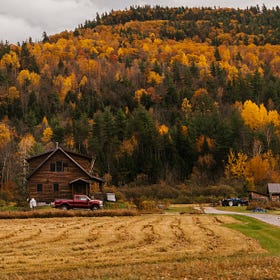Deadlines, Deadlines...
A few updates, requests for help, and Wendell Berry Reading Group Dates
It has been a while now since my last essay. I hoped to have published one by now, but time, a wedding in Germany, and some deadlines have not permitted this to happen. That is ok. I had stated a while ago that I was endeavouring to take much more time over my essays, crafting them and making sure they were as good as they could be. Quality not quantity. I am sure this pleases your (probably) already over-burdened inboxes.
But, I am working on a few pieces and I want to share the topics with you here. I am keen for my readers and supporters to have a say in the crafting and writing process of my work, so I would love to hear your ideas, comments, and wisdom. If I use your thoughts in my essays, I will be sure to give you a footnote. So please, email, comment on this post, message me at any time (and about anything!). I may not get back immediately, but I do read all comments and emails that I receive and strive to answer as many as I can.
So, here are some things I am working on that I would appreciate your thoughts on:
An essay on the tenacity of nature in recolonising our urban spaces and the conflicts that often arise from living alongside the wild in the city.
An essay on the importance of our food coming from the soil — and a treatise against the claim that biofermentation can/should replace farming (e.g. Monbiot, Regenesis).
An essay on how marginal areas and people groups can be a refuge from the machine.
An essay on Illegible Localism — I will just give the title for this one and see what thoughts it inspires! But a hint, there is a lot of James. C. Scott’s influence on this essay.
Some Old Essays for You to Read
I had a conversation recently about the first essay I ever wrote. It is still my favourite and the essay whose message has become central to all my work here on Over The Field. Its about the farmer and the goodness and necessity of his limitations:
The Good Farmer and His Limits
As it is over a year old, it is normally behind a paywall. But for today only (3rd October), I have removed the paywall so all can read it.
I have committed to not using AI in my writing on Over The Field. This essay explains why I have taken this stance and contains a treatise advocating for AI-free creativity in this age of disorientation and inauthenticity.
Wendell Berry is my foremost agrarian influence. But there can be a cost to reading him; a deep and searching cost that can make us feel highly uncomfortable.
The Cost Of Reading Wendell Berry
Wendell Berry Reading Group Dates
Staying on the theme of Wendell Berry, here are some dates for upcoming reading groups for paid subscribers and patrons along with the essays we will be discussing via Zoom.
Saturday 23rd November, 8 PM UK time, The Making of a Marginal Farm
Friday 17th January, 7 PM UK time, Faustian Economics
Saturday 22nd February, 8 PM UK time, Why I am Not Going to Buy a Computer
Saturday 15th March, 8 PM UK time, The Agrarian Standard
If you would like to sign up for the group you can do this here:
That’s all for now. I hope to have an essay out by next week and a Wisdom From The Agrarians post for paid subscribers this Saturday.
Warmly
Hadden









I also think the return of wildlife in human settlements is interesting, essentially it is an evolutions we could expect as nature finds its way. I note that in Sweden, it was first when boars became a nuisance in the cities that the opinion of the general public and policy-makers started to favor increased hunting and hunting methods previously not accepted.
It is mostly discussed in terms of bigger spieces, birds and mammals, but of course it happens with all sorts of species, including pathogens, where Legionella comes to mind. Many of the typical rural species are of course also species that adapted early to human made environments. Many birds thrive in the traditional rural landscapes, more than in any supposed "wilderness".
On Monbiot and farming, I refer to my own writings here.... https://gardenearth.substack.com/p/in-defence-of-farming and https://gardenearth.substack.com/p/the-columnist-in-the-moral-ivory
On your third point: I have also thought a lot about that. There are of course many mechanisms at play, but the most important are that marginal groups stand beside or outside "the market" and that they have benefitted little, or lost out, in the development of the Machine. They often also bend the rules in many ways as a survival strategy.